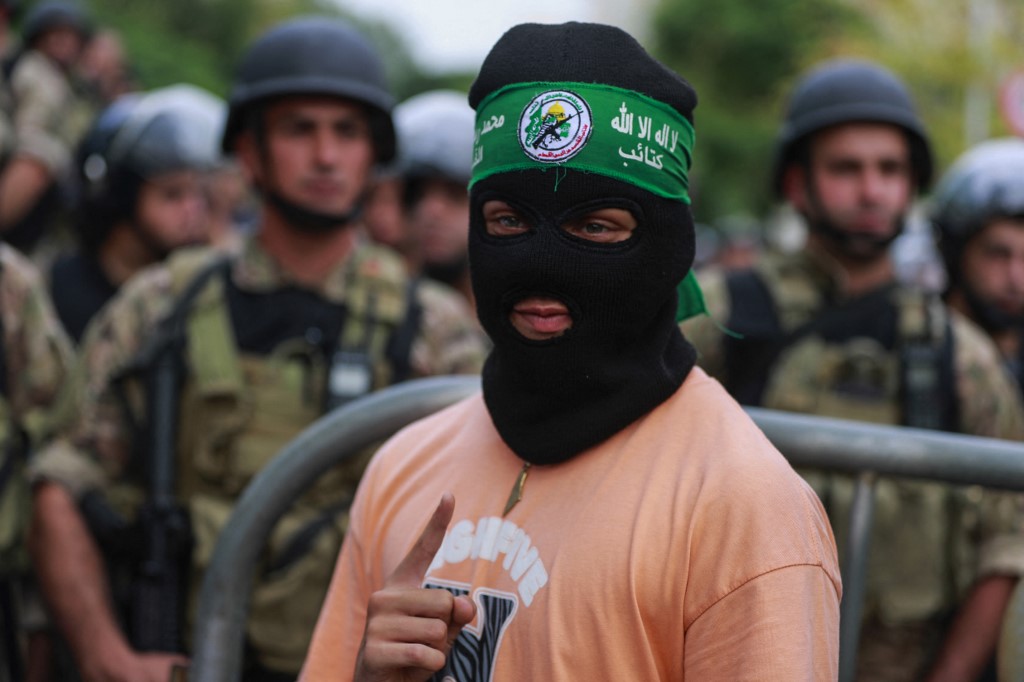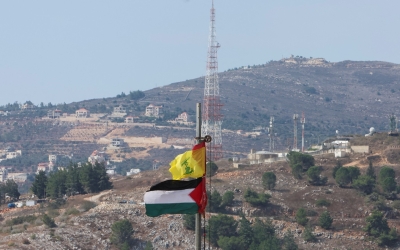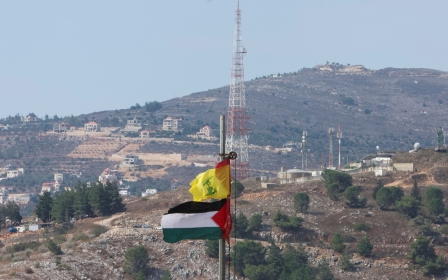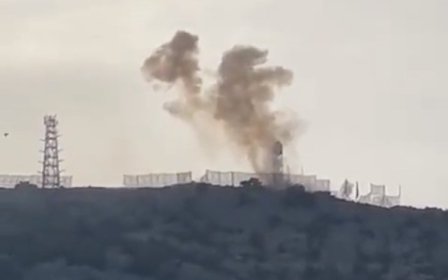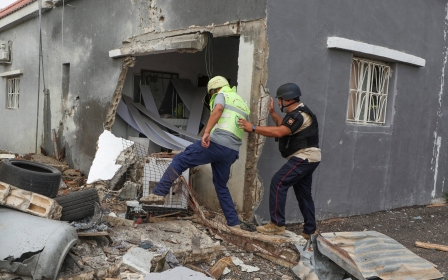Israel-Palestine war: Lebanese unite against Israel despite divisions
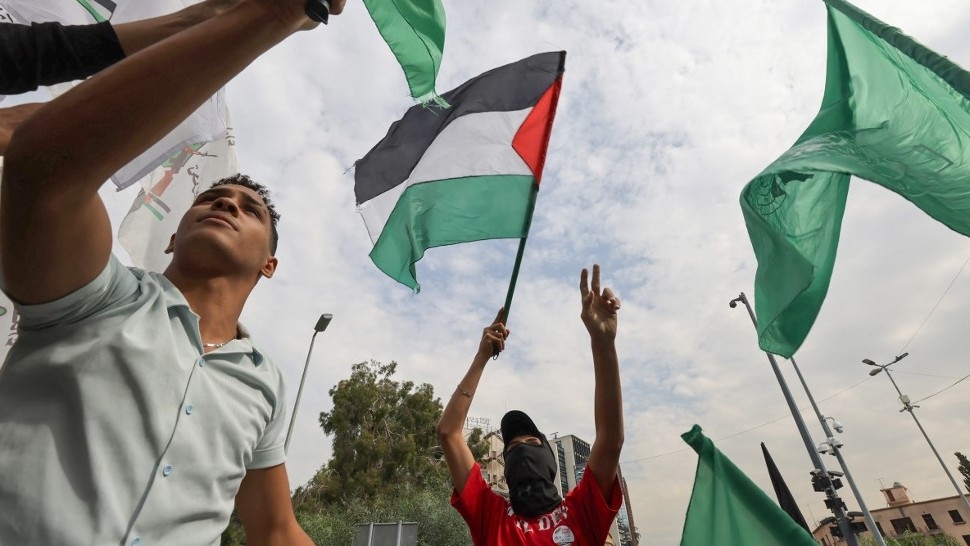
In a cafe in the southern suburbs of Beirut, a stronghold of Hezbollah, young people are glued to a television screen broadcasting the funerals of fighters killed in southern Lebanon during hostilities with the Israeli army.
All conversations revolve around the "Aqsa Flood," the name given by Palestinian armed groups to the attack on southern Israeli communities in the Gaza envelope on 7 October. This name has been adopted by all media and politicians close to the "axis of resistance" led by Iran.
"We must support the Palestinians by all means," declares Ali Cheaito, 23, while criticising the "silence of Arab regimes in the face of the genocide of the Gaza population".
"There should be no neutrality in the ongoing battle; we all must contribute to the liberation of Palestine," he told Middle East Eye.
"If Sayyed [Hassan Nasrallah, secretary-general of Hezbollah] orders us, we are ready to give our lives for this struggle; it is the duty of every Arab and Muslim," adds Hussein Fakih, 18.
New MEE newsletter: Jerusalem Dispatch
Sign up to get the latest insights and analysis on Israel-Palestine, alongside Turkey Unpacked and other MEE newsletters
The atmosphere is similar but the discourse more nuanced in a cafe in Antelias, a predominantly Christian city 12 kilometres north of Beirut.
"What is happening in Gaza is unbearable... all those children and women crushed by Israeli bombs," said Chloe Kosseifi, a history-geography teacher in her 30s. "But Lebanon should stay out of this war, which risks sweeping everything in its path."
Meanwhile, Ziad Khalil, an interior designer, said that "Lebanon has paid a heavy price for the Palestinian cause" and that "it is now the turn of other Arab countries to carry the torch".
Follow Middle East Eye's live coverage for the latest on the Israel-Palestine war
These two scenes reflect the prevailing atmosphere in Lebanon in the face of the tragic events unfolding in the Levant region. The Lebanese are torn between supporting the Palestinians and the fear of their country being dragged into a destructive war.
The concerns of the population are even greater because memories of the July-August 2006 war between Hezbollah and the Israeli army, which resulted in 1,200 deaths and over 4,000 wounded, mostly among civilians, remain etched in the collective memory.
"After 2006, Arab countries helped us rebuild the infrastructure, schools, and bridges destroyed by the Israeli air strikes," Kosseifi, who was 12 years old at the time of the last major war between Lebanon and Israel, recalls.
"Today, Saudi Arabia, the UAE, Kuwait, and Qatar have abandoned us. With the economic and political crisis that has brought us to our knees, we do not have the means to rebuild ourselves."
Palestinian cause 'deeply rooted'
Divergent opinions on the situation in Gaza and the stance Lebanon should take in this conflict are clearly expressed, even though, given the demonisation campaigns against Hezbollah conducted for years by a portion of the political class and local media, tensions could be stronger, and divisions more pronounced.
Attempts by some political and media figures to break the wave of solidarity with the Palestinians, relying on discourse from the civil war (1975-1990), have had limited success.
Faced with the backlash it provoked, a right-wing Christian MP, Camille Chamoun, deleted a post published on 15 October on X that showed a photo of a massacre committed in 1976 in the town of Damour (20 kilometres south of Beirut) and attributed to Palestinian fighters, with the following comment: "They [the Palestinians] sold their land and came to occupy ours."
Given the extent of the criticism they received and the minimal support for their actions, these dissenting voices have become almost inaudible at this stage.
"Some Lebanese personalities believed they could gain strong support from a portion of the population for their deeply racist reflexes," explains Walid Charara, a political analyst and journalist at the Lebanese daily Al Akhbar, "but they underestimated the deep-rooted Palestinian cause in the collective memory of the Lebanese, including a significant portion of the Christians, and the heinous crimes committed by the Israelis against civilians."
Al-Akhbar on Monday published a poll showing overwhelming popular support for the 7 October operation.
The survey, conducted by the Consultative Center for Studies and Documentation, was based on interviews with 400 respondents.
Approximately 80 percent of them supported the incursion, but most of them did not support Lebanese military intervention in the conflict.
'Gradual response'
The management of the current crisis by Hezbollah has also, according to several observers, helped prevent the emergence of a hostile climate, and neutralise the strong pressure exerted by Western countries on the Lebanese authorities and their local allies to openly disavow the actions of the anti-Israeli party.
"The leadership of Hezbollah has shown a great sense of responsibility in its response to the events in Gaza," a retired Lebanese general tells MEE.
'The leadership of Hezbollah has shown a great sense of responsibility in its response to the events in Gaza'
- retired Lebanese general
"Some may have expected or feared a decision, seen as impulsive, to fully open the Lebanese-Israeli front from the first day of the war. On the contrary, the party has opted for a gradual response to Israeli aggression by imposing new rules of engagement," he said.
"It has rendered a significant portion of the electronic monitoring and surveillance infrastructure that the Israelis took years to build along the border inoperative. It has destroyed many fortifications and armoured vehicles and inflicted losses on the Israeli army."
The result of this gradual response is that a fully fledged war is taking place along the border in a five-kilometre strip, while the rest of Lebanon, where life continues almost normally, remains at this stage preserved from Israeli attacks.
This tactic has compelled Israel to mobilise a third of its troops on the Lebanese front instead of deploying them around Gaza.
"Hezbollah intentionally shrouds its intentions and the nature of the red line that, if crossed by Israel, would trigger the full opening of the Lebanese front," adds the military expert.
"Combined with the silence of Hassan Nasrallah, who has not yet spoken since the start of the war, this tactic sows uncertainty within the Israeli military high command and political leadership and affects their decisions."
Two prominent political figures have played a role in preventing the emergence of an openly hostile climate towards Hezbollah.
Former minister and parliamentarian Walid Joumblatt, despite being highly critical of the anti-Israeli party in recent years due to Lebanese internal politics, expressed unwavering support for the Palestinian struggle from the outset of the "Aqsa flood".
His position gradually evolved, stating that while he would do everything in his power to spare Lebanon from a new war, he would firmly stand by Hezbollah in the event of a conflict with Israel.
The Druze leader went even further, assuring that if the Shia populations of south Lebanon were displaced due to a potential war, as happened in 2006 with over a million people forced to leave their homes, they would be welcomed in his strongholds.
Joumblatt instructed his PSP (Progressive Socialist Party) leadership to take the necessary logistical measures by conducting a census of sites - schools, public buildings, vacant apartments - where potential displaced persons could be accommodated in the regions of Chouf, Aley, Baabda (east and southeast of Beirut), and Rachaya-Hasbaya (eastern Bekaa).
Voices of conciliation
Gebran Bassil, the leader of the Free Patriotic Movement (CPL, founded by Michel Aoun), has also contributed to neutralising the emergence of an anti-Palestinian and anti-Hezbollah sentiment in Lebanese Christian circles.
Despite his alliance with Hezbollah showing signs of strain for the past year, this Christian leader, son-in-law of the former president of the republic, has made numerous conciliatory statements.
Like Joumblatt, his discourse revolves around two priorities: first, Lebanon must not be drawn into a new conflict; second, the country has the right and duty to face Israeli aggression, and all Lebanese must remain united in case of war.
To advance this discourse and promote internal dialogue, Bassil has met with leading political figures in the country, including Prime Minister Najib Mikati, Parliament Speaker Nabih Berry, and Hezbollah-backed presidential candidate Sleiman Frangieh, individuals with whom he had been at odds for months.
In addition to all these conciliatory efforts, a noteworthy position was taken by Youmna Gemayel.
The daughter of the assassinated former president Bachir Gemayel, considered by a significant portion of Christians as a champion of the struggle against the Palestinians, and by another portion as an ally of Israel, announced on X: "If war is imposed upon us, we will stand with any Lebanese, regardless of their faith, opinion, or affiliation."
Given the seriousness of the situation and the uncertainties it may bring, the Lebanese are trying to mend the internal front, which has been marred by countless rifts for years. It's hard to say how long this front will withstand the pressures exerted by western powers and their local allies.
*This article was originally published in French.
Middle East Eye delivers independent and unrivalled coverage and analysis of the Middle East, North Africa and beyond. To learn more about republishing this content and the associated fees, please fill out this form. More about MEE can be found here.


